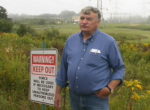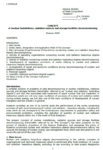Обращение с радиоактивными отходами и отработавшим ядерным топливом, образующихся при работе атомных электростанций России



Arctic is a highly discussed region now. For example, the Arctic is mentioned when discussion goes about climate change and melting of Arctic ice, new oil and gas fields, or the Arctic Council, which represents the interests of the peoples of the Arctic and the Arctic countries.
In this report, we want to present you the Arctic strategy, developed by the Russian Federation and how it may impact the environment and people. You can find out what is the main priority of the Government of the Russian Federation in this region for the near future.

Арктика. Последнее время этот регион под пристальным вниманием политиков, ученых и общественников. Об Арктике говорят, например, когда речь идет об изменении климата и таяние арктических льдов или новых месторождениях нефти и газа, или об организации Арктический совет, который представляет интересы народов Арктики и арктических стран.
Из этого доклада вы узнаете, что такое Арктика, ознакомитесь со стратегией Российской Федерации по развитию Арктики, а также увидите, как активное промышленное освоение арктических территорий может повлиять на окружающую среду в этом регионе.
 Informational videos for decommissioning of old nuclear power plants
Informational videos for decommissioning of old nuclear power plants
 Информационные деком ролики по выводу из эксплуатации старых атомных электростанций.
Информационные деком ролики по выводу из эксплуатации старых атомных электростанций.
 Hanhikivi. A documentary about a new Russian-Finnish nuclear power plant on the Gulf of Bothnia of the Baltic Sea. Showing the possible social, enviromental and economic impacts on Finland-Russia and the Baltic-Scandinavian region.
Hanhikivi. A documentary about a new Russian-Finnish nuclear power plant on the Gulf of Bothnia of the Baltic Sea. Showing the possible social, enviromental and economic impacts on Finland-Russia and the Baltic-Scandinavian region.
Production JSC Decommission, 2016
 The film tells about development of an anti-nuclear nongovernmental organization struggling for closure of one nuclear power plant (NPP) in Maine (USA). The Maine Yankee NPP was the first one decommissioned according to the «green field» principle. The characters of the film recall their fight for closure of the NPP which was difficult and joyful and the road they had chosen once made them steeled in battle.
The film tells about development of an anti-nuclear nongovernmental organization struggling for closure of one nuclear power plant (NPP) in Maine (USA). The Maine Yankee NPP was the first one decommissioned according to the «green field» principle. The characters of the film recall their fight for closure of the NPP which was difficult and joyful and the road they had chosen once made them steeled in battle.
Raymond Shadis, leader of NGO Friends of the Coast, with the support of his wife Patricia and a small group of friends through the unbelievable efforts and at the expense of hardship had managed to get together a group of activists who over the time of many years did their best to initiate decommissioning of the Maine Yankee plant.
 Today on the southern coast of the Baltic Sea near borders of three countries: Lithuania, Belarus and Russia, three projects of huge nuclear power plants are being implemented practically at the same time. The synchronicity of initiation and development of these projects gave an idea to observers to call them in combination the Baltic Nuclear Triangle This small territory faced a real fight for nuclear power production. Who needs these huge NPPS? And why are they being built? Experts, leaders of NGOs, politicians and residents of the region think, protest and act, trying to confront the monsters from nuclear power industry. Igor Shkradyuk, energy expert: In case of serious aggravation of the situation between these countries, NPPs within few kilometers from the border can become a threat to energy security and the overall security. An emergency at one of these three NPPs will lead to the inevitable pollution of the other states’ territories. How will these countries adjust their relations, while solving problems of consequences and responsibility for people’s health and lives?
Today on the southern coast of the Baltic Sea near borders of three countries: Lithuania, Belarus and Russia, three projects of huge nuclear power plants are being implemented practically at the same time. The synchronicity of initiation and development of these projects gave an idea to observers to call them in combination the Baltic Nuclear Triangle This small territory faced a real fight for nuclear power production. Who needs these huge NPPS? And why are they being built? Experts, leaders of NGOs, politicians and residents of the region think, protest and act, trying to confront the monsters from nuclear power industry. Igor Shkradyuk, energy expert: In case of serious aggravation of the situation between these countries, NPPs within few kilometers from the border can become a threat to energy security and the overall security. An emergency at one of these three NPPs will lead to the inevitable pollution of the other states’ territories. How will these countries adjust their relations, while solving problems of consequences and responsibility for people’s health and lives?
 The present Concept of nuclear installations, radiation sources and storage facilities decommissioning (hereinafter referred to as “the Concept”) has been prepared on the ground of statutory provisions of the Russian Federation and expresses the policy of Rosatom concerning nuclear and radiation hazardous objects decommissioning taking into account the function of nuclear energy use management body which was entrusted to it and covers the period till the year 2030. Rosatom considers as one of its priority goals the performance of the works concerning provision of safe decommissioning of nuclear and radiation- hazardous objects, including the ones which do not correspond to the contemporary requirements to population safety and environmental protection, including the reduction of quantity of nuclear and radiation hazardous objects which are in the mode of final shutdown.
The present Concept of nuclear installations, radiation sources and storage facilities decommissioning (hereinafter referred to as “the Concept”) has been prepared on the ground of statutory provisions of the Russian Federation and expresses the policy of Rosatom concerning nuclear and radiation hazardous objects decommissioning taking into account the function of nuclear energy use management body which was entrusted to it and covers the period till the year 2030. Rosatom considers as one of its priority goals the performance of the works concerning provision of safe decommissioning of nuclear and radiation- hazardous objects, including the ones which do not correspond to the contemporary requirements to population safety and environmental protection, including the reduction of quantity of nuclear and radiation hazardous objects which are in the mode of final shutdown.